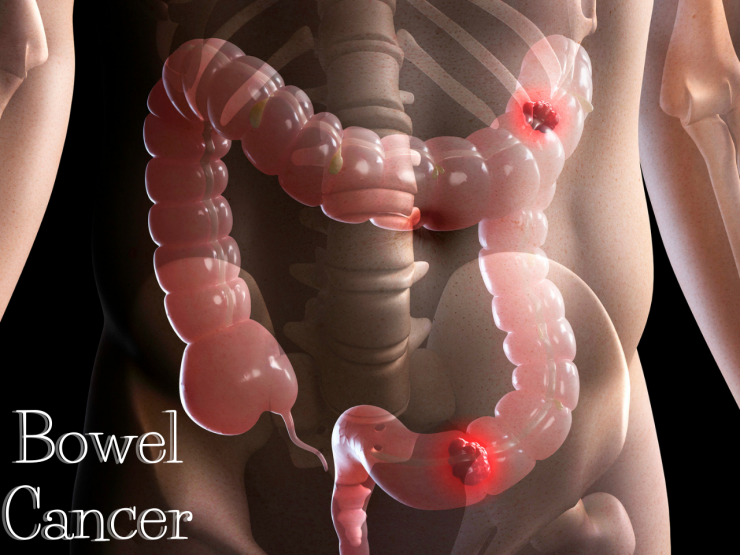Bowel Cancer
In the UK around 43,000 people are diagnosed with bowel cancer every year.
Every year in the UK over 16,500 people lose their lives to bowel cancer.
April is Bowel Cancer awareness month. We aim to raise awareness and understanding of this deadly disease to help people recognise symptoms, in the hope of saving more lives.
What is Bowel Cancer?
The human body is made up of trillions of cells that grow and divide in a regulated manner.
When cancerous cells develop, they become abnormal, divide and grow at an uncontrolled rate.
Most bowel cancers are resultant of pre-cancerous growths referred to as polyps.
Bowel polyps are extremely common, it is estimated around 1 in 4 people over the age of 50 have them. They are small growths that can be found on the inner lining of the large bowel or rectum.
Bowel cancer is the name given to cancer that originates in the large bowel lining but sometimes it can start in the small bowel, but this is much more uncommon.
Depending on where the cancer starts it is referred to as colorectal, rectal or colon cancer.
Symptoms of Bowel cancer & who is most at risk of developing it
Bowel cancer is one of the most prevalent types of cancer in the UK, the fourth most common and second biggest killer of all cancers.
If the cancer is diagnosed early enough at a localised stage the survival rate is 91%.
Both men and women can get bowel cancer but if you are aged 60 or over, you are more likely to develop bowel cancer with 9 in 10 cases affecting this age bracket.
If your mother, brother, father, or sister has had the disease this also increases your lifetime risk of developing the disease.
Furthermore, those who are obese and do little exercise, have a diet high in processed or red meats and lacking in fibre also have an increased risk.
Signs and symptoms of bowel cancer include but are not limited to:
· Persistent blood in your faeces & rectal bleeding
· Abdominal Pain
· Constipation & trouble passing wind
· Weight loss
· A lump located in the back passage or stomach
· Feeling bloated
· A change in bowel movements
Do you suspect you have Bowel Cancer?
If you have been experiencing any of the symptoms for over three weeks or experience them intermittently you should book to see your GP for advice and screening.
Diagnosis & Screening
The earlier the diagnosis the easier it is to treat and the chances of survival increase.
However, bowel cancer screening is not always 100% accurate.
If a doctor locates a lump in the rectum or abdomen during a rectal examination, they will want to carry out some tests to determine if it is cancer.
Flexible Sigmoidoscopy: This test is comprised of an enema to clean and clear the bowel and a flexible telescope with a camera on the end is inserted and used to scan the lower half of the bowel.
Colonoscopy: Again, a telescope is inserted via the anus and into the rectum, this instrument is longer though allowing it to examine the whole of the large bowel.
There is also a test known as CT Pneumocolon and Colon Capsule.
The bowel cancer screening test known as FIT can be done from the comfort of your own home.
So, what is the faecal immunochemical test (FIT)?
FIT is a stool test that has been created to find small trace amounts of blood in your faeces. The tube lid has a small stick on it that is used to take a sample to facilitate observing blood which may not be visible to the naked eye.
Those aged between 50 and 74 and residing within the UK will receive invitations to partake in bowel cancer screening programmes every two years.
If you aren’t displaying symptoms and are not eligible for an NHS screening you can pay for a private test which is often available from pharmacies. If you are displaying symptoms, you should visit your GP.
Treatment
A team known as MDT (Multidisciplinary team) are responsible for organising and managing health and care services for people with complex care needs such as cancer. They will work with the patient to support and assist with care goals.
The three main and most common treatments for bowel cancer are Chemotherapy, radiotherapy and surgery.
Chemotherapy & Radiotherapy
The patient’s MDT will determine if cancer can be reduced by either Radiotherapy or Chemotherapy before undergoing surgery. This is done as it often improves the outcome of cancer. This is generally done daily for five weeks, followed by a 12-week rest period, before a follow-up scan and discussion to decide on surgery.
Surgery
When it is determined cancer hasn’t spread beyond the bowel, most bowel cancers will be treated through surgery. Usually, this means that cancer and the lymph gland by the blood vessels responsible for supplying that area of the bowel are removed and the two ends are re-joined (anastomosis).
In the situation that an emergency operation is required or there is an issue due to the location of cancer the two ends are not always joined back together immediately.
After undergoing treatment, the removed tissues will be examined to determine the stage of cancer. This is done to determine if any further treatment is required and which kind.
Following successful treatment, the patient will be monitored over five years through clinic appointments, blood tests, scans and colonoscopies to ensure the cancer doesn’t return and to discuss options if it does.
How to reduce your risk of developing bowel cancer
You can reduce your chances of developing bowel cancer by living an active lifestyle and keeping a healthy diet rich in vegetables and fruits and minimising your consumption of red and processed meat. You should try not to consume too much alcohol and stop smoking too.
Data sourced form*



